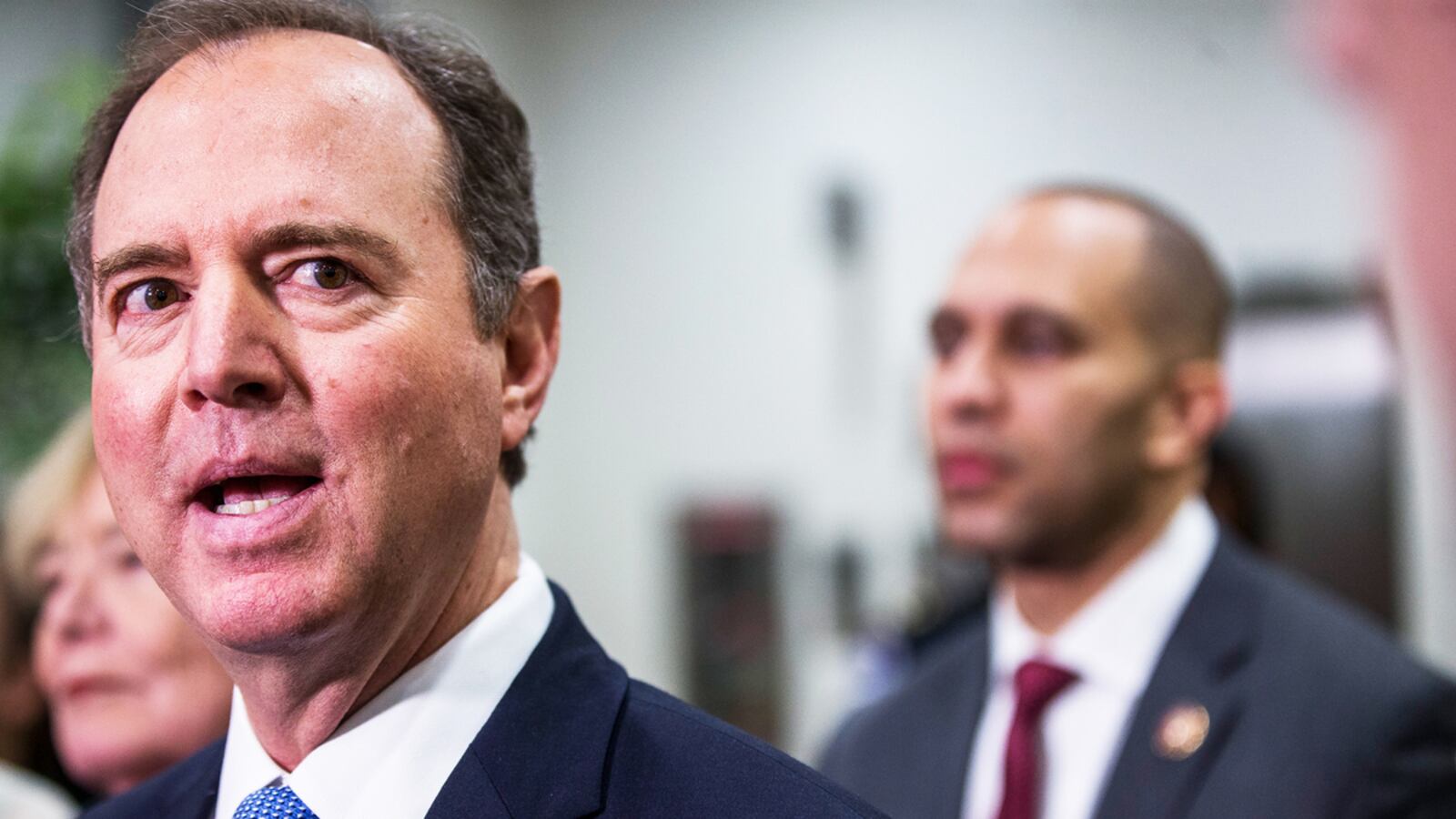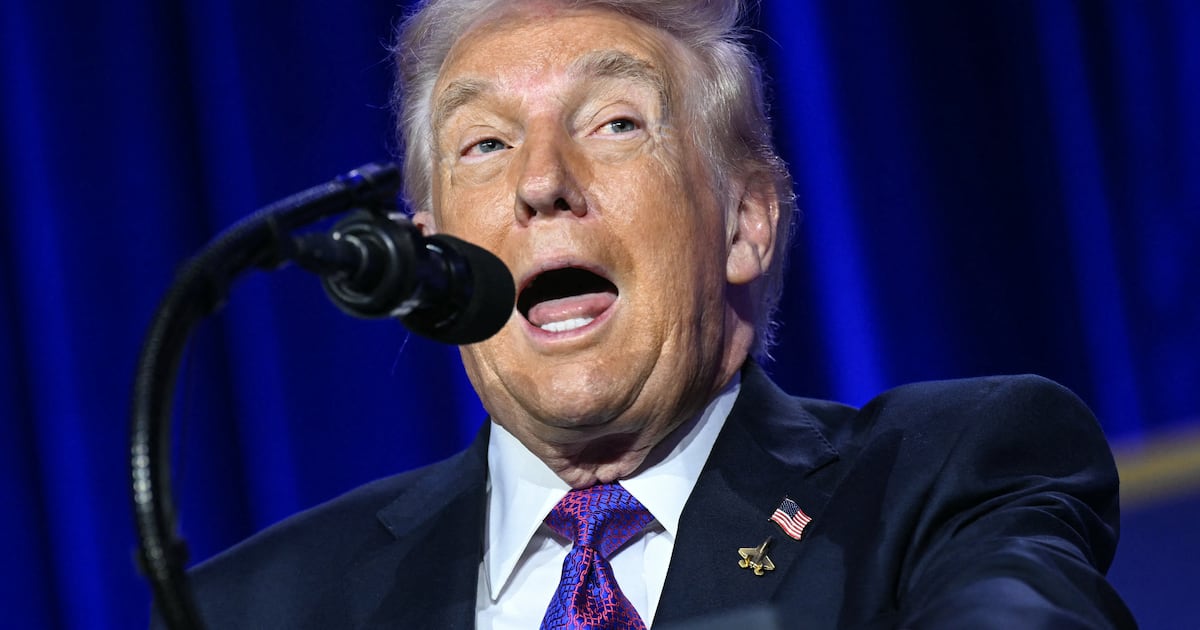For nearly two weeks, Democrats took to the floor of the Senate in the hopes that GOP lawmakers would support the call for additional witnesses as part of impeachment proceedings against President Donald Trump.
To a person, party members believed that the evidence they gathered and case they presented was compelling and nearly flawless in its execution. Their convictions only hardened after several rounds of massive news breaks—from audio recordings of the president to seeming confirmation from his former national security adviser, John Bolton, that Trump sought a quid pro quo with Ukraine.
But as the days rolled by and Republican after Republican publicly declared they’d heard enough, a sense of dismay has begun to set in. Increasingly, Democrats believe and concede, there was simply no argument they could have made that would have moved the needle.
“The arguments that have been asserted by the White House are nonsense,” said Rep. Mary Gay Scanlon (D-PA). “There's plenty of evidence to move anyone who's listening. But I think what we're seeing is there is no amount of evidence that will move the Senate Republicans in this political environment. I think we expected that if they followed their constitutional oath, they would actually have a real trial. I think it's really just a failure of courage.”
Asked whether there was any frustration in the Democratic ranks about the lack of movement to call witnesses, Scanlon joked, “What? I don’t sound frustrated?”
A final vote on whether to hear new evidence or witnesses is set for Friday. Publicly, Democrats on both sides of the Capitol had held out hope that four GOP senators will side with them on, among other things, the need to call Bolton as a witness.
Increasingly, however, Democrats acknowledge that their efforts are likely to fail and that the impeachment proceedings will be wrapped up shortly thereafter. An announcement late Thursday night from Sen. Lamar Alexander (R-TN) that he would vote against calling more evidence basically sealed the deal, leaving no path for a prolonged trial.
“It’s more than frustrating—it's pathetic,” said Sen. Michael Bennet (D-CO). “If you had any regard at all for the prerogatives of the legislative branch, to allow the White House to stonewall the House of Representatives in a completely unprecedented way, and then accept a set of rules … that are just a cover-up for what the president has done, I think demonstrates a complete lack of regard for what this institution is supposed to be about.”
Inside the party, there is little sense that the House managers of the Trump impeachment did anything wrong in advocating their case. Though the White House defense team has repeatedly pointed to the House’s impeachment process as inadequate and therefore illegitimate—leaning especially on their declining to take the step of issuing a subpoena for Bolton, and the way they handled the subpoena authorization process more generally—few if any Democrats view those arguments as good-faith in nature.
“The Republicans are hiding behind the process because they know on the substance, the facts look really bad,” said Rep. Raja Krishnamoorthi (D-IL), a member of the Intelligence Committee.
Still, there are some in the party who wonder if Democrats could have extracted a bit more political pain from Republicans in the process of getting to a Senate acquittal. One Democratic aide told The Daily Beast that impeachment investigators could have engaged in more “box-checking.” But on the things that actually mattered, the aide said, Democrats got it right.
For example, on the White House’s procedural arguments that Democrats’ subpoenas were illegitimate, the aide asked, “Is there a single voter, Senate or American, who that moves?”
Max Bergmann, a senior fellow at the Center for American Progress and one of the think tank’s sharpest advocates for impeachment, argued that if House managers made a misstep, it was in sticking too closely to the constitutional framing of the charges (abuse of power) and not the visceral ones (bribery).
“You needed to call this a crime. Calling it a crime was essential. And I think they’ve done it in the course of the hearing. But from a messaging perspective they should have said the president committed crimes,” said Bergmann. “For the country a trial is about crimes and i just think that was an important message that didn’t quite break through.”
Still, Bergmann said, House managers delivered a “masterful performance” over the course of the past week that convincingly made the case against Trump. Ultimately, he and others argued that the White House would have picked apart their impeachment process no matter how it was prosecuted.
“Whatever the House would have done, it would not have been adequate,” said Sen. Ben Cardin (D-MD). “It was clear that President Trump had given instructions for no cooperation and the lawyers found out ways to accommodate that.”
Left to assess the likelihood that no witnesses would be called, some Democrats have tried to find some silver linings. While the impeachment trial may have not moved Senate Republicans, it had offered the public additional clarity about where those lawmakers stood on matters such as foreign election interference and deference to the president. It also, they argued, had not proved to be the catastrophic political misstep that many Democratic prognosticators had initially feared. If anything, some felt that it would prove electorally beneficial.
“I just think for some of the senators, there will never be enough,” said Rep. Eric Swalwell (D-CA). “They truly would acquit him for shooting someone on Fifth Avenue. It's just, they believe this person who can do no wrong. I think they're wildly out of... sync with, you know, who we are as Americans. I'm still hopeful that they will allow witnesses, but I'll just say that I think the American people will have the last word... at the ballot box.”
And yet, even if Democrats did stand to benefit from Republican lawmakers aligning themselves so closely with Trump, it was not—they conceded—without a cost. There was fear that the institutional prerogatives of Congress had been damaged by the willingness of GOP lawmakers to not demand more witnesses and documents from the White House.
“We expected that new additional evidence would come forward,” said Rep. David Cicilline (D-RI), “and what normally happens is you present that evidence at the trial.”
But beyond that was the fear that the very type of presidential behavior that had led to Trump’s impeachment—the solicitation of foreign help to dig up dirt on his opponents—could become codified by his acquittal; or, even worse, that it would become accepted practice for every presidential candidate going forward should he not be voted out of office in November.
“At that point,” said Bergmann, “it is a disaster.”










